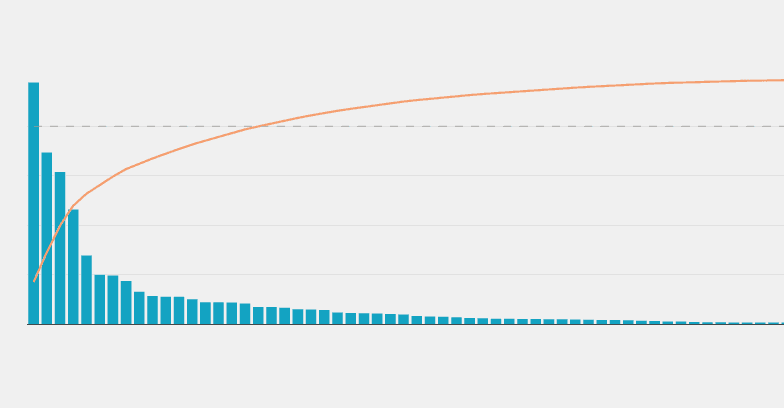
My bet on the future of software engineering
Despite the AI hype, I think we're going to see more of the same.
Happy Birthday to me! 🎉
Lately, I've been seeing A LOT of repeated discourse. Someone (mostly students and junior engineers) claims the end is near for this field. The thing is. To no one's fault, there's always a different catalyst for these takes.
This time, it's AI.
Before that, it was Web3.
Before that, it was "the cloud".
Before that, it was WYSIWYG.
Before that, it was a slew of supposedly "revolutionary" tools that were supposed to make us obsolete.
But if you've been in the field for a while, you know the cycle.
The hype comes -> it isn't all that's cracked up -> something gives -> we just move on to the next thing.
I've been thinking a lot about this lately, especially as the AI discourse has gotten louder and proved to be much more permanent than its predecessors (looking at you, Web3).
The funny part is that I see the same pattern play out in my own (admittedly still young) career. I know the more seasoned folks in the industry have seen this shit for decades. The tools change, the abstractions get more capable, but the core problems (the ones that actually matter) don't go away. If anything, they get more way more interesting.
The 80/20 illusion
If you haven't heard of the Pareto Principle, it's a concept that states that 80% of the results come from 20% of the effort.
Throughout my extensive piloting of various AI tools, if there's anything I've learned, it's that it oftentimes aids the first 80%, but the last 20% (the stuff that matters for actual maintainability, scalability, etc.) still needs engineering rigor.
Clients (and stakeholders) love the idea of building things themselves, until something breaks, or doesn't scale, or needs to integrate with the rest of the messy real world and existing systems. Then, suddenly:

they need engineers again.
We've seen this movie before. When IBM mainframes gave way to PCs, people said programmers would be obsolete because the end users could build their own macros and their own apps.
In 1977, Ken Olsen (founder of Digital Equipment Corporation) famously said: "There is no reason anyone would want a computer in their home."
But guess what. Instead, demand for engineers exploded. Same thing with AWS, YouTube, Shopify, and every other platform that hid the hard parts through abstraction. The pie just got bigger, and the bar for what counted as "software engineering" moved up a little. We see the same thing happening again...with AI.
So what are you saying?
The point I'm trying to highlight is that thinking in systems, anticipating failure, designing for scale, making tradeoffs. That's the stuff that can't be faked, and that many folks (bless them) usually have no idea how to do. The tools may change... like, now we're expected to know React, uvicorn, and whatever the next hot framework is...but even then, the mindset is the throughline.
Honestly, we should not even be worried about the field disappearing. What we should be worried about is the shortterm pain from business types who think they can automate us away, only to realize (again) that the last 20% is where all the value and risk lives. Try as they might, they still need the nerds on the group project to save their asses. 🙄
Another thing that hasn't changed is the relationship between the money, leadership, and the people actually building things.
The money wants more money, leadership wants to look good, and the creatives (that's us) are somewhere in the middle, trying to make the magic happen. We're still seen as a cost center most of the time, and there's always a new metric or process to "measure productivity." But the industry isn't going anywhere.
Remember. People will always need experts who understand technology deeply.
Until someone actually solves the model collapse problem (and I'm not holding my breath), this latest AI trend is just another in a long line of "game changers" that didn't actually change the game.
The real career risk
If you're worried about your future, here's my take: if all you know how to do is the 80% (the rapid prototyping, the scaffolding, the "easy wins") then I'm sorry, but you very well might be at risk.
But, if you're building the skills to think in systems, to design for scale, to debug the gnarly stuff, you'll be fine. The stack will keep moving up, and you'll move with it easily, like engineers have been doing for decades.
Ok yeah, as an engineer, when you get more senior, most people do infact hit that terminal ceiling, unless they want to play the politics game. There's way less roles, and require a different skill set. But that's true in pretty muchevery field.
The only real shortcut to avoid that is to join a small, fast-growing company where they need to promote out of necessity. But of course, that's not always possible when you i.e., have baby Nyuma running around.
One last thing
As you get more experienced, you'll realize that the biggest lever you have in your career is choosing who you work for and what you work on. Don't work for assholes. Don't work for companies that use people as a product, or build things you can't stand behind and or motivate yourself to work on. It's a tough line to walk, but it's worth it.
You may be wondering. Nyuma, how do you know all of this as such an early career software engineer? 😅 And to be honest, it's mostly because i've read an unhealthy amount of Gergely Orosz's newsletters and have spent way too much time thinking and talking to other (seasoned/older) engineers about this stuff both IRL and online.
So what's my bet?
The future of software engineering is really just going to be more of the same. The tools will change, the hype cycles will come and go, but the need for people who can think deeply about systems, who can build and maintain the last 20%, isn't going anywhere. If anything, it's only getting more important.
And honestly, I wouldn't have it any other way.